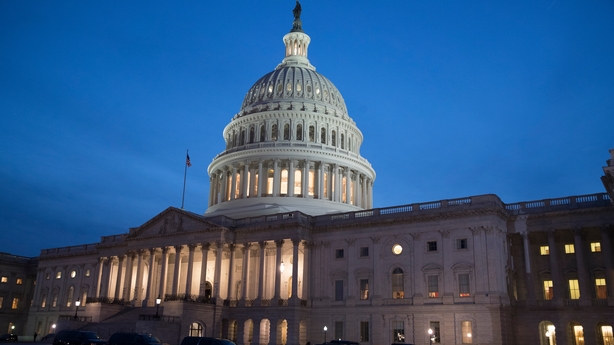The US Senate has narrowly approved a tax overhaul, moving Republicans and US President Donald Trump a step closer to their goal of slashing taxes for businesses and the rich while also offering a mixed bag of changes.
In what would be the largest change to US tax laws since the 1980s, Republicans want to add $1.4 trillion over 10 years to the $20 trillion national debt to finance changes that they say would further boost an already growing economy.
"We are one step closer to delivering MASSIVE tax cuts for working families across America," Mr Trump said in an early-morning tweet.
Celebrating their Senate victory, Republican leaders predicted the tax cuts would encourage US companies to invest more and boost economic growth.
"We have an opportunity now to make America more competitive, to keep jobs from being shipped offshore and to provide substantial relief to the middle class," said Mitch McConnell, the Republican leader in the Senate.
The Senate approved their bill in a 51-49 vote with Democrats complaining that last-minute amendments to win over sceptical Republicans were poorly drafted and vulnerable to being gamed later by lawyers and accountants in the tax avoidance industry.
"The Republicans have managed to take a bad bill and make it worse," said Senate Democratic leader Chuck Schumer.

"Under the cover of darkness and with the aid of haste, a flurry of last-minute changes will stuff even more money into the pockets of the wealthy and the biggest corporations."
No Democrats voted for the bill, but they were unable to block it because Republicans hold a 52-48 Senate majority.
The framework for both the Senate and House bills was developed in secret over a few months by a half-dozen Republican congressional leaders and Trump advisers, with little input from the party's rank-and-file and none from Democrats.
Numerous last-minute changes were made to the bill.
One was to make state and local property tax deductible up to $10,000, mirroring the House bill. The Senate previously had proposed entirely ending state and local tax deductibility.
Under the bill, the corporate tax rate would be permanently slashed to 20% from 35%, while future foreign profits of US-based firms would be largely exempted from tax.
Talks will begin, likely next week, between the Senate and the House of Representatives, which has already approved its own tax bill.
We are one step closer to delivering MASSIVE tax cuts for working families across America. Special thanks to @SenateMajLdr Mitch McConnell and Chairman @SenOrrinHatch for shepherding our bill through the Senate. Look forward to signing a final bill before Christmas! pic.twitter.com/gmWTny3SfS
— Donald J. Trump (@realDonaldTrump) December 2, 2017
Mr Trump wants that to happen before the end of the year, allowing him and his Republicans to score their first major legislative achievement of 2017, despite controlling the White House, the Senate and the House since he took office in January.
Democrats slammed the proposed tax cuts as a giveaway to businesses and the rich financed with billions of dollars in taxpayer debt.
The tax overhaul is seen by Mr Trump and Republicans as crucial to their prospects at mid-term elections in November 2018, when they will have to defend their majorities in Congress.
On the individual side of the tax code, the top tax rate paid by the highest-income earners would be cut slightly.
Democratic Senator Richard Blumenthal said Mr Trump controls more than 500 pass-through companies that will directly benefit. "So the president may be celebrating, but most Americans will rue this day," Mr Blumenthal said.
The Senate bill would gut a section of Obamacare by repealing a fee paid by some Americans who do not buy health insurance, a step critics said would undermine the Obamacare system and raise insurance premiums for the sick and the old.
Six Republican senators, who wanted and got last-minute amendments, and whose votes had been in doubt, said yesterday they would back the bill and did so.
Senator Bob Corker, one of few remaining Republican fiscal hawks who pledged early on to oppose any bill that expanded the federal deficit, stood out as the lone Republican dissenter.
"I am not able to cast aside my fiscal concerns and vote for legislation that ... could deepen the debt burden on future generations," said Mr Corker, who is not running for re-election.

